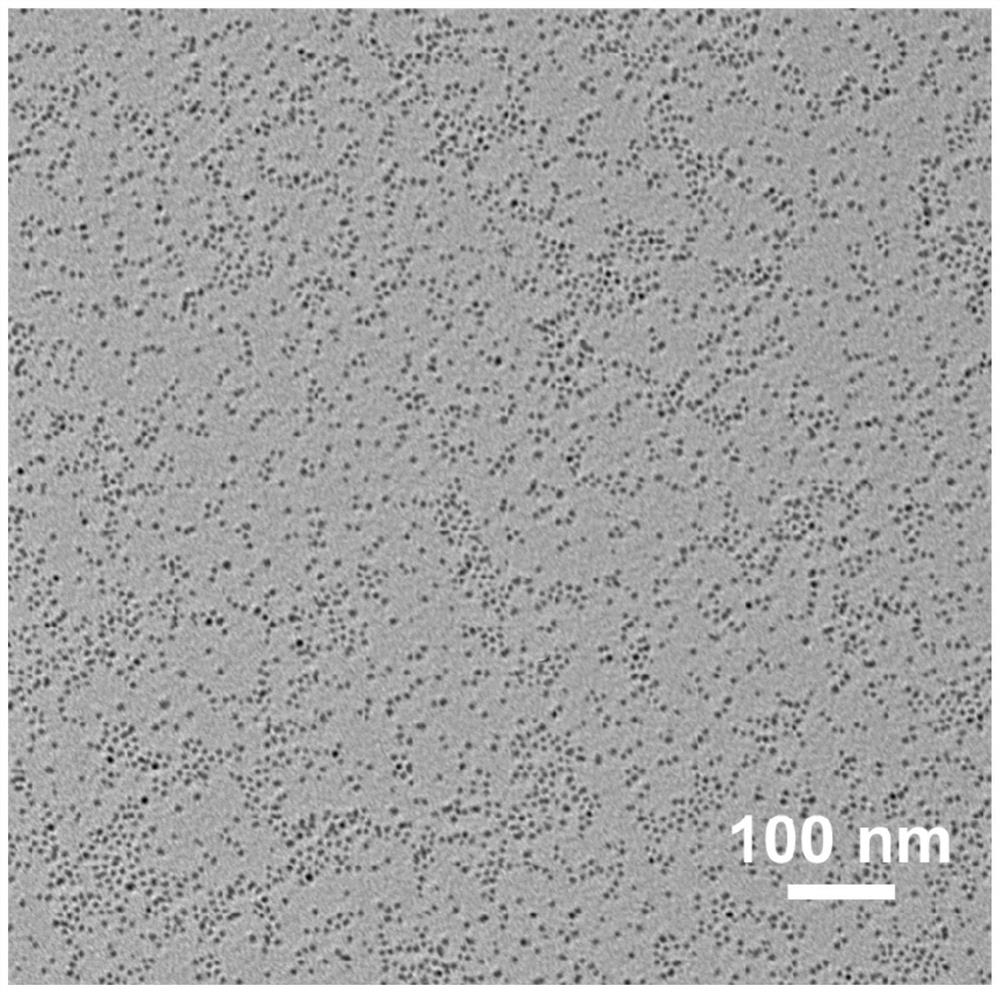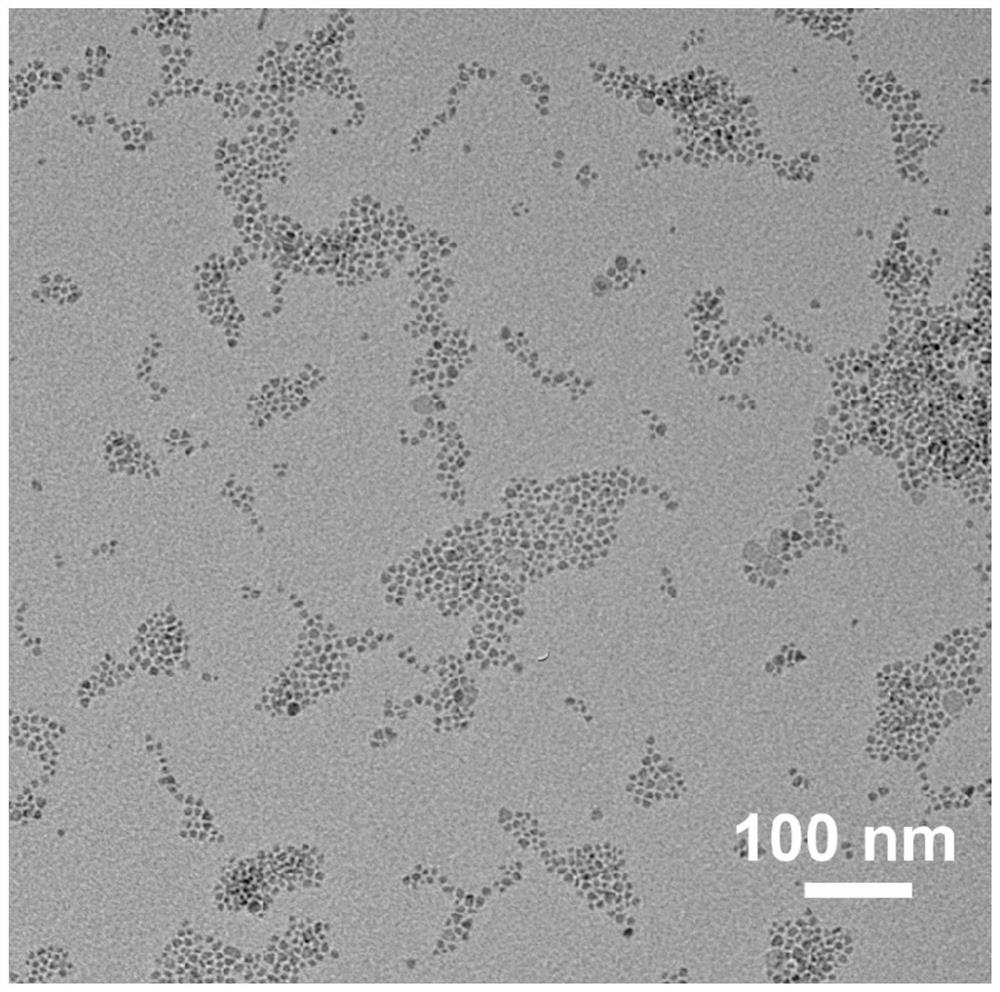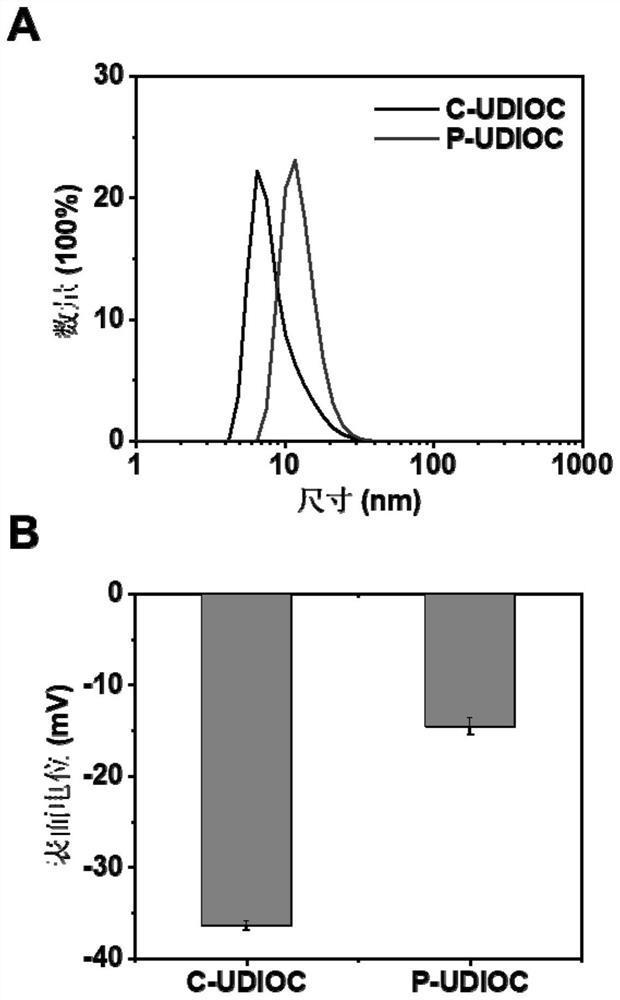A t1-t2 dual-mode ultra-high field magnetic resonance contrast agent and its preparation method and application
A magnetic resonance contrast agent, T1-T2 technology, applied in nano-magnetism, pharmaceutical formulations, preparations for in vivo tests, etc., can solve problems such as toxic side effects, interference with T1 contrast agent relaxation process, and reduction of T1 signal. Achieve high biocompatibility, good possibility of clinical transformation, and high biosafety
- Summary
- Abstract
- Description
- Claims
- Application Information
AI Technical Summary
Problems solved by technology
Method used
Image
Examples
Embodiment 1
[0044] Embodiment 1: Preparation of ultra-small iron oxide nanoparticles
[0045] Accurately weigh 10.8g ferric chloride hexahydrate (FeCl 3 ·6H 2 (2, 40mmol) and 36.5g sodium oleate (120mmol) were placed in a 500mL round bottom flask, and then 80mL absolute ethanol, 60mL deionized water, and 140mL n-hexane were added to the round bottom flask using a graduated cylinder, and the mixture was placed in the oil 70°C oil bath in a bath, stirring and reacting for 4 hours. After the reaction was completed, the mixture was transferred to a separatory funnel, 30 mL of distilled water was added for extraction, the lower transparent liquid was discarded, and the operation was repeated three times. After the extraction was completed, a dark liquid was obtained, which was removed by rotary evaporation, and then heated and dried under vacuum to finally obtain the iron oleate complex in the form of a waxy solid.
[0046] Accurately weigh 0.9g (1mmol) iron oleate complex and place it in a...
Embodiment 2
[0048] Example 2: Ligand Exchange of Ultra-Small Iron Oxide Nanoparticles Using Citric Acid
[0049] Take a chloroform solution containing 120mg of ultra-small iron oxide nanoparticles, add acetone to precipitate, centrifuge and redisperse the black solid in o-dichlorobenzene solution, place it in a 50mL round bottom flask, accurately weigh 0.1g of citric acid and add Add o-dichlorobenzene and N,N-dimethylformamide to the flask, so that the total volume of the liquid is 15 mL, and the volume ratio of o-dichlorobenzene and N,N-dimethylformamide is 1:1. The flask was placed in an oil bath at 100°C and stirred for 24 hours. After the reaction, cool to room temperature, add diethyl ether to precipitate, then wash the precipitate twice with diethyl ether and acetone respectively, and disperse the ultra-small iron oxide nanoparticles exchanged with citric acid ligands in deionized water for use.
Embodiment 3
[0050] Example 3: Ultra-small iron oxide nanoparticles modified with polyethylene glycol after ligand exchange
[0051] There are carboxyl groups on the surface of ultra-small iron oxide nanoparticles after citric acid ligand exchange, you can choose polyethylene glycol with modified amino groups at the end, and use the condensation reaction between carboxyl and amino groups to modify polyethylene glycol on the surface of ultra-small iron oxide particles , to obtain T1-T2 dual-mode ultra-high field contrast agent.
[0052] (1) Take 50 mg of the ultra-small iron oxide nanoparticle solution after citric acid ligand exchange and disperse it in 10 mL of deionized water, add 50 mg of polyethylene glycol-amino (Shanghai Ziqi Biological Co., Ltd.), 0.05 g of 1-(3- Dimethylaminopropyl)-3-ethylcarbodiimide hydrochloride, 0.06g N-hydroxysuccinimide, stirred overnight at room temperature, adjusted the pH value of the solution to 9, stirred at room temperature for 24 hours, and transferre...
PUM
| Property | Measurement | Unit |
|---|---|---|
| particle diameter | aaaaa | aaaaa |
| particle diameter | aaaaa | aaaaa |
Abstract
Description
Claims
Application Information
 Login to View More
Login to View More - R&D
- Intellectual Property
- Life Sciences
- Materials
- Tech Scout
- Unparalleled Data Quality
- Higher Quality Content
- 60% Fewer Hallucinations
Browse by: Latest US Patents, China's latest patents, Technical Efficacy Thesaurus, Application Domain, Technology Topic, Popular Technical Reports.
© 2025 PatSnap. All rights reserved.Legal|Privacy policy|Modern Slavery Act Transparency Statement|Sitemap|About US| Contact US: help@patsnap.com



